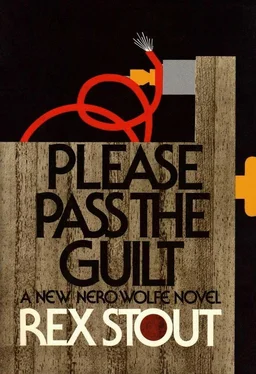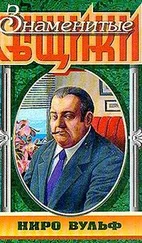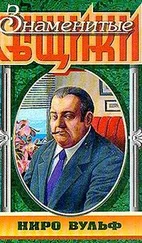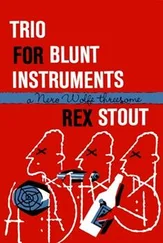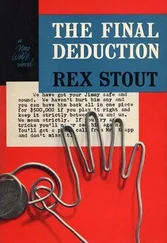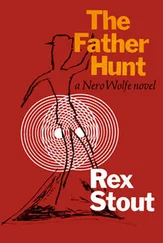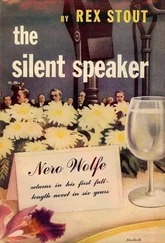“Saving you the trouble of asking questions,” he said, and extended a hand. I gave him the card and he put it back in the case and the case in his pocket; and he turned and went. Not slow short steps; he marched. I followed out to the hall, and when he had opened the front door and crossed the sill and pulled the door shut, not banging it, I went back to my desk, sat, cocked my head at Wolfe, and spoke:
“You told Doc Vollmer yesterday that you read to learn what your fellow beings are up to. Well?”
He scowled. “I have told you a dozen times that ‘Doc’ is an obnoxious vulgarism.”
“I keep forgetting.”
“Pfui. You never forget anything. It was deliberate. As for Kenneth Meer, there has been no picture of him in the Times . Has there been one in the Gazette ?”
“No. His name several times, but no picture. Nor any report that he got blood on his hands, but of course he saw plenty. I suppose, since it’s a favor for a friend, I’ll have to see a couple of people and find out—”
“No. Get Dr. Vollmer.”
“But shouldn’t I—”
“No.”
I swiveled and swung the phone around. Of Vollmer’s three numbers, the most likely one at that hour was the unlisted one on the third floor of his house, and when I dialed it he answered himself. Wolfe got at his phone and I stayed on.
“Good evening, doctor. That man came, half an hour late, and has just left. He refused to give us any information, even his name, and we had to coerce him by a ruse with a concealed camera. Under constraint he identified himself by showing us his motor vehicle operator’s license, and then departed without a word. His name has recently been in the news in connection with a murder, but only as one of those present at the scene; there has been no published indication that he is under suspicion or is likely to be. Do you want his name, for Dr. Ostrow?”
“Well.” Silence for at least ten seconds. “You got it by — uh — coercion?”
“Yes. As I said.”
“Then I don’t think—” Another silence, shorter. “I doubt if Irwin would want it. He never uses coercion. May I ask him and let you know?”
“Certainly.”
“Do you intend — Are you interested in the murder? Professionally?”
“Only as a spectator. I am not involved and don’t expect to be.”
Vollmer thanked him for the favor, not enthusiastically, and they hung up. Wolfe looked at the wall clock — five past ten — and reached for his current book, Grant Takes Command , by Bruce Catton. I went to the hall and up the two flights to my room, to catch the last inning or two at Shea Stadium on television.
We keep both the Times and the Gazette for three weeks, sometimes longer, and even if the bank balance had been at a record high I would probably have had another go at the accounts of the Odell murder just for curiosity, since I had now met one of the cast of characters. But we needed a job. In the past five months, the first five of 1969, we had had only six cases, and the fee had gone to five figures in only one of them — getting a damn fool out of a nasty mess with a bunch of smoothies he should have been on to at the first contact. So the checking account balance had lost a lot of weight, and to meet the upkeep of the old brownstone, including the weekly payroll for Theodore and Fritz and me, by about the middle of July Wolfe would have to turn some documents into cash, and that should be prevented if possible. So it wasn’t just curiosity that sent me to the basement Thursday morning for old newspapers.
The murder was two weeks old, but what had happened, and how, had been plain and clear in the first reports and had not been substantially revised or amended. At 3:17 P.M. on Tuesday, May 20, a man named Peter J. Odell had entered a room on the sixth floor of the CAN building on West Fifty-fourth Street, pulled open the bottom drawer of a desk, and died instantly. The bomb that shredded him was so powerful that it not only blew the metal desk up to the ceiling but even buckled two of the walls. CAN stood for Continental Air Network, which occupied the whole building, and Peter J. Odell had been its vice-president in charge of development. The room and desk were not his; they belonged to Amory Browning, the vice-president in charge of programming.
All right, that was what happened, but in addition to the main question, who had put the bomb in the drawer, there were others that had still not been answered, at least not for publication. It wasn’t unheard of for a vice-president to enter another vice-president’s room, but why had Odell opened that drawer? That drawer. It was known to enough people at CAN to get into both the Times and the Gazette that that drawer had rarely, possibly never, been opened by anyone but Browning himself because nothing was kept in it but a bottle or bottles of twelve-year-old Ten-Mile Creek bourbon. It had almost certainly been known to Odell.
No one had admitted seeing Odell enter Browning’s room. Helen Lugos, Browning’s secretary, whose room adjoined his, had been down the hall in a file room. Kenneth Meer, Browning’s chief assistant, had been down on the ground floor in conference with some technicians. Browning himself had been with Cass R. Abbott, the president of CAN, in his office — the corner office on that floor. If anyone knew why Odell had gone to Browning’s room, he wasn’t saying. So the answer to the question, Who put the bomb in the drawer? depended partly on the answer to another question: Whom did he expect to open the drawer?
Rereading the accounts in fifteen copies of the Times and fifteen of the Gazette , I was impressed by how well I had absorbed the details of an event we had not been involved in, and by nothing else. There was nothing to give me a nudge on a start of what I had in mind. It was after eleven o’clock when I finished, so Wolfe had come down from the plant rooms, and I went up to the phone in my room to dial a number — the switchboard of the Gazette . It was an afternoon paper and Lon Cohen’s line was usually busy from 10 A.M. to 4:20 P.M., but I finally got him. I told him I wanted thirty seconds and he said I could have five.
“Then,” I said, “I won’t tell you about the steer that grew the Chateaubriands that Felix is saving for us. Can you meet me at Rusterman’s at a quarter past six?”
“I can if I have to. Bringing what?”
“Just your tongue. And of course plenty of lettuce for later.”
The “later” meant the poker game at Saul Panzer’s apartment which started at eight o’clock Thursday evenings. Lon made an appropriate retort about lettuce and hung up, and I dialed another number I didn’t have to look up and got Felix, and told him that this time my request for the small room upstairs was strictly personal, not on behalf of Wolfe, and that if he was short on Chateaubriands, tournedos would be fine. He asked what kind of flowers would be preferred, and I said my guest would be a man from whom I hoped to get some useful information, so instead of flowers make it four-leaf clovers for luck.
An announcement to Wolfe that I wouldn’t be there for dinner was not required, since I never was on Thursdays. Since his dinner time was 7:15, I couldn’t eat at his table and be at Saul’s poker table at eight. I merely mentioned casually, after we had finished with the morning mail, that I would be leaving around a quarter to six, before he came down from the plant rooms. I did not mention Kenneth Meer, and neither did he, but around the middle of the afternoon Vollmer phoned to say that Dr. Ostrow didn’t want to know what Ronald Seaver’s name was. Which of course was a polite lie. Dr. Ostrow would certainly have liked to know the name, but not from Wolfe if he had got it by a trick.
Читать дальше
